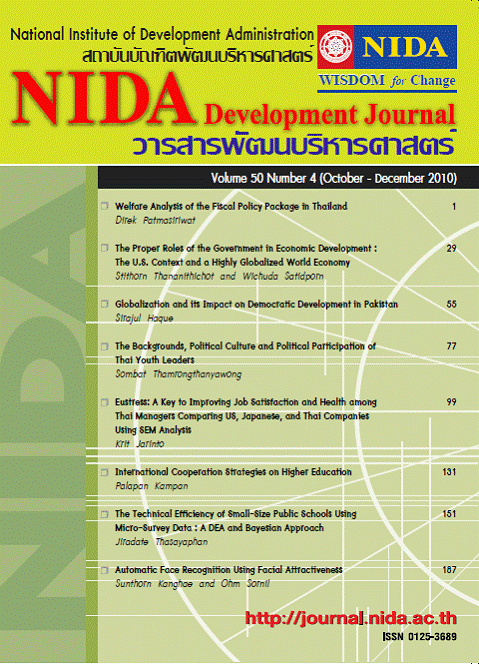Welfare Analysis of the Fiscal Policy Package in Thailand
Keywords:
Property Tax, Tax Burden from Property, Taxation Benefit Incidence Social Welfare FunctionAbstract
This paper presents an analysis of the simulated fiscal reform package for Thailand on household welfare. Our model assumes that Thai government will introduce two new policy instruments, i.e., property tax to be levied on land, residential and commercial properties and government spending that targeted for poor households and informal workers. The redistributive effects from this scheme is calculated based on household surveys conducted by the National Statistical Office in 2006. The major findings are noted: first, the property tax package will yield an additional revenue of 91.3 billion baht to local governments; secondly, the tax revenue is earmarked for government spending in the form of social assistances that benefit low-income households, own-account workers and informal workers; thirdly, there will be a net welfare gain for households with an assumption of aversion to income inequality of 0.3, 0.5, and 0.8 respectively.
บทความนี้เสนอการวิเคราะห์สวัสดิการสังคม ซึ่งเกี่ยวข้องกับนโยบายการคลังในอนาคต (เชิงสมมติ) แบบจำลองสันนิษฐานว่ามีเครื่องมือการคลัง 2 เครื่องมือ คือ ภาษีทรัพย์สินซึ่งจัดเก็บจากที่ดิน บ้านเรือน และอาคารที่มีใช้ประโยชน์เชิงพาณิชย์ การจัดสรรรายจ่ายภาครัฐเพื่อช่วยเหลือประชาชนสองกลุ่ม ได้แก่ ครัวเรือนที่มีรายได้น้อย ผู้ประกอบอาชีพอิสระหรือผู้ใช้แรงงานไม่เป็นทางการ ต่อจากนั้นวิเคราะห์ผลกระทบการถ่ายโอนรายได้โดยอิงข้อมูลครัวเรือน ที่สำรวจโดยสำนักงานสถิติแห่งชาติในปี พ.ศ. 2549 ผลการศึกษาสรุปได้ว่า หนึ่ง รายได้จากภาษีทรัพย์สินมีมูลค่า 91.3 พันล้านบาทโดยประมาณ สอง รายได้ภาษีถูกนำไปจัดสรรเป็นเงินโอนเพื่อครัวเรือนคนจน ผู้ประกอบอาชีพอิสระ และผู้ใช้แรงงานที่ไม่เป็นทางการ สาม ผลการศึกษาโดยอิงฟังก์ชั่นสวัสดิการพบว่า สวัสดิการสุทธิมีความเปลี่ยนแปลงทางบวก ทั้งนี้โดยอิงข้อสมมติว่าการลดความเหลื่อมล้ำของรายได้เป็นสิ่งที่สังคมพอใจ โดยกำหนดค่าพารามีเตอร์ an aversion to income inequality เท่ากับ 0.3, 0.5 และ 0.8 ตามลำดับ





